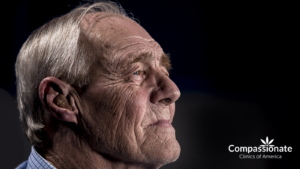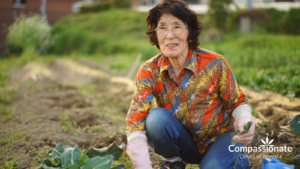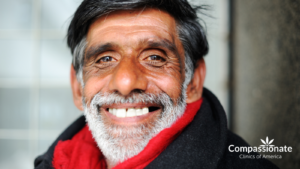Cannabis and Aging: 4 Important Benefits of Cannabis for Older Adults
What is the connection between cannabis and aging?
No matter how much we try to deny it, stop it from happening, or turn it around, the fact we will all age is the most definite thing about life. While many will say that aging is a privilege, and we tend to agree, there are a lot of difficulties and challenges that come with the aging body that medical cannabis may be able to help with.
The Fastest-Growing Demographic Using Medical Cannabis
According to the U.S. Census Bureau, more than 56 million adults ages 65 and older live in the United States, accounting for about 16.9% of the nation’s population.
By 2030, however, because of the prevalence of Baby Boomers, more people within the USA will be over the age of 65 than the age of five. This means that the age group 65+ will be the largest group of people seeking medical services.
Critics of the United States healthcare system will say that healthcare is unprepared for the influx of elderly people requiring health services, requiring systems to develop new approaches to healthcare delivery.
Medical cannabis certifications are one of those approaches that can help address many of the health concerns of aging Americans; in fact, older Americans are the fastest-growing demographic using medical cannabis and obtaining a medical marijuana card from their state.
In this article, we will sum up four interesting facts we have learned about the role of cannabis in the aging process through recent research, and how getting a medical cannabis certification and medical marijuana card can help ease some of the difficulties associated with aging.
Cannabis and Aging Fact #1: Cannabis may prevent problematic opioid use in older adults
Older adults are the highest population at risk of developing problematic opioid use or opioid use disorder (OUD). This age group is more at an increased risk than other age groups because of a higher prevalence of pain, comorbid or coexisting illnesses, other drug and alcohol dependencies, and depression, often requiring substance use interventions.
Problematic use of opioids by older adults tripled between the years 2015 to 2018, indicating that this is becoming an increasing problem as the United States gains a larger elderly population.
A 2023 study looked at the prevalence of opioid prescriptions in states where medical cannabis laws had been passed. The study identified “a significant decrease in direct payments from opioid manufacturers to pain medicine physicians as an effect of [medical marijuana law or MML] passage” and found that “physicians in states with an MML are prescribing fewer opioids.”

The study concluded that this phenomenon was “due to the availability of medical marijuana as a substitute.” In other words, where there is medical cannabis available legally, residents of states are more likely to consider other options, such as getting a medical marijuana card, rather than choose to use opioids to manage chronic pain.
With problematic opioid use and OUD being more prevalent in older adults, this study shows significant promise for cannabis and aging in that this group may be able to avoid this when provided other options like a medical cannabis certification.
Cannabis and Aging Fact #2: Cannabis may help stimulate muscle regeneration in older cannabis users
It’s widely known that as adults go through the aging process, they begin to lose strength and mass within their muscles leading to difficulty with mobility or accessibility, or chronic pain.
A 2021 study looked at cannabis and aging and the role of the CB1 receptor within the endocannabinoid system in muscle regeneration. The CB1 receptors essentially act as traffic cops for neurotransmitters or signals between the various brain regions and the parts of the body such as the central nervous system.
When the CB1 is modulated, they provide immediate feedback to parts of the body telling them what to do: turn up, or turn down activity, such as body temperature, our levels of hunger, or how alert we feel.

The study saw that the CB1 was expressed higher in older adults when it came to muscle strength and muscle mass than older adults.
While this study is extremely preliminary, the researchers suggest further research to understand the role of modulating or influencing the CB1 in the treatment of cachexia (wasting syndrome), sarcopenia (the age related loss of muscle mass and strength), and other muscle-devastating conditions in older humans.
In other words, cannabis therapy can play a role in regenerating and strengthening muscle in older adults through the role of the CB1.
Cannabis and Aging Fact #3: “Less may be more” for older adults in terms of cognitive function improvements
It is believed that THC may help improve cognition in older adults when there may be a cognitive impairment such as Alzheimer’s Disease or related dementias, however, how well THC may improve cognition depends on age and amount of THC consumed.
A 2020 study that reviewed other animal studies that looked the effects of cannabis on cognition in aging saw that extremely low doses of THC improved cognition in very old animal subjects (rodents) while somewhat higher chronic doses improved cognition in moderately aged rodents.
This review suggests that when using cannabis as a way to improve cognition, it may be more beneficial for younger adults and middle aged adults to use higher doses or higher potency cannabis products, and to titrate down in THC potency as one gets older.
Of course, when exploring cannabis through a medical marijuana card, it’s best to always try a few different products, doses, and methods of consumption to find what works best for you.

Cannabis and Aging Fact #4: The endocannabinoid system may have a greater role in our sleep for older adult cannabis users
There is evidence that suggests that the endocannabinoid system may play a greater role in our sleep during the aging process and have more of an effect on the aging brain than it may in the brain of young adults or those in middle age.
Sleep is one of the most important things that humans need, as it plays an important role in our physical and mental health and is food for the human brain. The purpose of sleep is to maintain healthy brain function and physical well-being, and our bodies need sleep to support important functions such as growth and development, proper immune functioning, balancing hormones, solidifying memory, and other critical functions to maintain physical and mental health.
Initial studies provide evidence that the endocannabinoid system is involved in the sleep-wake cycle as well as sleep homeostasis.
Sleep homeostasis is the process of ensuring our bodies get enough sleep by signaling when the body needs sleep (i.e. that feeling of being tired and wanting to sleep), and also helps extend sleep when someone is sleep deprived as a means to “catch up” on sleep.
In particular, when the CB1 receptor that we mentioned earlier is activated, it plays a role in our sleep/wake cycle, promoting sleep, thus ensuring we get adequate rest.
It is believed that using CBD is one way to activate the CB1 receptor, and thus promote sleep and rest.
Explore Medical Cannabis Use for Healthy Aging
There is still so much to be discovered in health care regarding the potential of medical cannabis and aging through further research, yet the studies above show that there are dedicated efforts to understand how the plant can affect numerous medical conditions, their symptoms, overall executive function, and quality of life.
With older Americans being the fastest demographic of cannabis users, and evidence showing that opioid use is going down due to the availability of medical cannabis, we think that is a very good testament to the positive effects medical cannabis use is having on the lives of those in their Golden Years. We are dedicated to helping our patients explore cannabis and aging through our award-winning patient education.
If you are in or are entering the later years of your life, or are the caregiver of an elderly person and are interested to learn more about cannabis and aging and getting a medical cannabis certification or medical cannabis card, reach out to us at (888) 372-0325 or book your appointment online.
Our compassionate, caring team will walk you through all the steps of getting your medical cannabis certification and registering for your medical cannabis card to become a medical cannabis patient in your state.
























